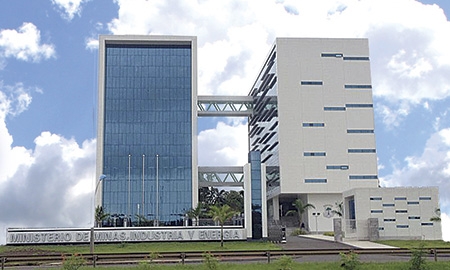Back in the early 1990s, when Equatorial Guinea had stagnant economic growth and one of the poorest populations in the world, it opened its doors to U.S. oil companies including ExxonMobil, Marathon Oil Corp. and
Noble Energy who plied its territorial waters in search of potential resources. Equatorial Guinea’s startling transformation into one of Africa’s leading energy exporters began in earnest just a few years later, in 1995, when ExxonMobil first started pumping crude at the massive Zafiro offshore field, located in the Gulf of Guinea.
The subsequent boom brought double-digit growth for the next decade, rapidly expanding the country’s per-capita GDP, once among the lowest in the world, to the largest on the continent, roughly four times larger than South Africa’s.
Since those early days, U.S. companies have been investing and working alongside Equatorial Guinea’s government and local population, helping to harness its vast wealth of mineral resources.
“The oil and gas industry is experiencing some of its best times,” says Gabriel Obiang, Minister of Energy, Mines and Industry. “This is so because there is a precedent created by how the government functions, how the ministries function, and this has allowed investors to work with confidence and stability.”
Equatorial guinea exports in excess of 300,000 barrels of oil per day to North america, Europe and asia.
---------------------------------
In 2000, natural gas export receipts totalled $190 million. Today, they have nearly topped the $17 billion mark.
|
Though it occupies one of the smallest territories in all of Africa, and possesses one of its smallest populations at just over 700,000 inhabitants, Equatorial Guinea is currently Africa’s fourth-largest oil exporter, sending a steady output of more than 300,000 barrels per day (bpd) to markets in North America, Europe and Asia. It ranks in the top 10 among African nations in terms of total proved reserves of both oil, at 1.1 billion barrels, and natural gas, with 1.3 trillion cubic feet. The United States has long been one of the most important purchasers of oil from Equatorial Guinea, importing over 40,000 bpd in recent years. Likewise, U.S. companies make up some of the largest foreign investors in Equatorial Guinea, and play a major role in the development of its hydrocarbon resources.
Equatorial Guinea has welcomed the capital and expertise of American firms, and has made plain its intention to continue these projects in the future. “We have a very big relationship, based on business cooperation and economic interests,” Minister Obiang explains. “We will continue working with small and medium-sized American businesses in drilling and hydrocarbon projects.”
Recent discoveries of large natural gas resources and the development of downstream activities like refining have begun to bring much-needed diversity to the country’s petroleum sector. The growth in natural gas alone has made a huge difference, with exports valued at nearly $17 billion, up from just $190 million back in 2000.
Because the oil and gas industry plays such a crucial role in Equatorial Guinea – it makes up 95% of the country’s economic output and 99% of its export revenues – the Ministry of Energy, Mines and Industry is at the forefront of its economy and labor market. “The primary mission is to exploit petroleum resources in the most efficient way,” Minister Obiang explains. “After this comes job creation. Given this responsibility, we must generate human capital through training and education, and create the conditions so that we have projects with a need for human resources.”
Minister Obiang credits his country’s rapid development to its openness vis-à-vis the world economy, and its dedication to facilitating partnerships with private investors. “We have worked on our tax policy, streamlining regulations and incentivizing foreign companies who wish to find domestic partners. But the most important thing is generating new capital. We have tested ourselves against international best practices in creating new capital and we want to replicate these models.”
Like many countries in Africa, Equatorial Guinea has its share of challenges, including poor governance indicators, inequality, as well as high rates of poverty and underdevelopment. The government has responded to these issues with a steadfast commitment to public safety and a globally integrated economy, which has been seen as a positive sign for potential investors. Steps toward adhering to globally backed good governance measures like the Extractive Industries Transparency Initiative have also been welcomed.
“I’d like to single out the security that exists in the country, which is the result of conscientious work, after having analyzed and learned from the negative experiences of many neighboring countries,” Minister Obiang explains.
“Equatorial Guinea is a unique country and probably one of the wealthiest in Africa, in terms of the richness of its culture and the depth of its people.”
Ever confident about his country’s attractiveness and its wealth of opportunities, Minister Obiang invites international investors and multinational businesses to come and see for themselves what Equatorial Guinea has to offer. “If someone really wants to do business, they must come here,” he goes on. “Decisions can be made based on various analyses, but one must come visit first of all.”

0 COMMENTS